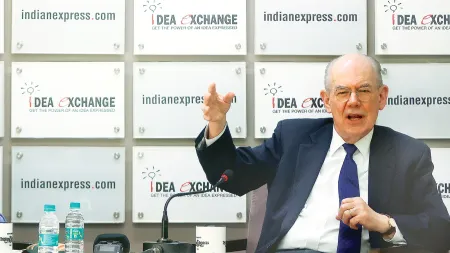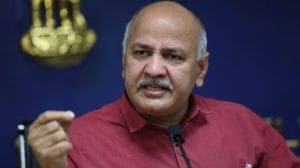- India
- International
Explained: Zubin Mehta, the man and what he means to music
Iconic conductor Zubin Mehta and the Israel Philharonic Orchestra's ‘Music Director for Life’ retired on Sunday after a 50-year-tenure.
 In the life of western classical music, Zubin Mehta has been, and will remain a significant name.
In the life of western classical music, Zubin Mehta has been, and will remain a significant name.
On Sunday, the famed Bronfman Auditorium, the largest concert hall in Tel Aviv and home to the Israel Philharmonic Orchestra, resonated with one of Gustav Mahler’s most popular and successful works, Symphony Number 2 — better known as Resurrection.
The five-movement symphony talks about the beauty of the after-life. It opens with a symphonic poem called Funeral Rites, asks questions such as ‘Is there life after death?’, remembers joyous times, and concludes with an intense hope for regeneration — a sort of rebirth after death has been dealt with.
83-year-old master conductor Zubin Mehta chose Mahler’s legendary work to take his final bow after a 50-year stint with the Israel Philharmonic Orchestra, which bid goodbye to its “Music Director for Life”.
In pictures | Zubin Mehta takes final bow with Israel Philharmonic
Mehta, who was born in Mumbai, said to the audience: “Among all the things I was able to achieve in the past 50 years, there is one thing I could not accomplish. I cannot speak Hebrew. I am sorry for that. Let me express it with music now.”

He then conducted piano concerto number 2 by the Hungarian composer Franz Liszt. An emotional Mehta finished with “goodbye to my family”. He will be succeeded by 30-year-old Lahav Shani.
In the life of western classical music, Zubin Mehta has been, and will remain a significant name.
Not just for being one of the greatest music conductors in the world who built a reputation for himself by interpreting the music of Romantic-era titans such as Mahler, Tchaikovsky, Brahms and Beethoven, but also because he never shied away from taking a political stand or speaking about his political views on Israel, war and other matters.
He presented Mozart’s Requiem with the Israel Philharmonic Orchestra in war-torn Sarajevo at a charity concert amid the ruins of the National Library, and played Wagner in Israel, where his music and ideas are considered anti-Semitic. (It never happened again.)
In 1978, he asked Israel’s Prime Minister Menachem Begin to send the Orchestra to Cairo as a gesture of goodwill. In 1999, he conducted Israeli and German musicians near the site of the Nazi concentration camp in Buchenwald.
And in 2013, he played at the controversial Ehsaas-e-Kashmir concert in Srinagar. “I’m very sorry that we are not playing Wagner, but it will happen again one day. But one has to consider the emotions of the people. People are still living with numbers on their arms. They don’t want to be transported back to the days of terror. One can understand that. As for Kashmir, we didn’t do anything wrong except make music there. I’m glad we did it. I would do it all over again,” he had told this correspondent in an interview.
Mehta has a music school at the University of Tel Aviv, which has about eight Arab students from the north, who are being taught full-time by the Philharmonic members. “My dream is to have an Israeli-Arab track in the Israel Philharmonic. And it will happen one day. There is no bias in the orchestra against the Arabs. We have an Arabic soloist. A very fine Arabic pianist plays with us sometimes,” Mehta had said. He has often rued how some great artistes just didn’t visit Israel because they did not agree with the politics of Israel.
Born and raised in Mumbai in a Gujarati family, Mehta always wanted to be a musician. His parents nudged him towards studying medicine though, and he did pursue a couple of semesters. His father Mehli Mehta founded The Bombay Symphony Orchestra, which comprised Parsi amateurs, Goan folk musicians, and some members of the Navy band. Mehta was stunned when he heard a real orchestra play in Vienna for the first time. It was the Vienna Philharmonic, which even today remains one of the world’s greatest orchestras.
The Israel Philharmonic Orchestra appointed Mehta Music Adviser in 1969, and Music Director for Life in 1981. He was Music Director of the Los Angeles Philharmonic from 1962 to 1978, and of the New York Philharmonic from 1978 to 1991.
Mehta’s musical career will be remembered for his immense knowledge, charisma on stage, and interpretation of some great music with mush intensiy. Whenever he got on the rostrum for an orchestra, or in the pit for an opera, he even breathed in rhythm with the musicians. “We have to have the knowledge, technical command and control to convince 100 musicians of our interpretation,” he had said.
The baron of the baton has retired, at the pinnacle of his career. Mahler, Tchaikovsky and Beethoven will always be thankful for him. So will all the millions who listen to and love his music.
More Explained
EXPRESS OPINION
May 22: Latest News
- 01
- 02
- 03
- 04
- 05







































